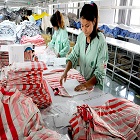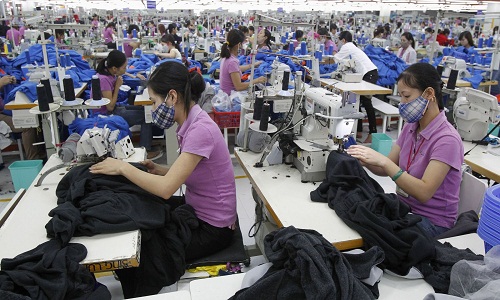FW
Hennes and Mauritz (H&M) has teamed up with the London College of Fashion on a sustainability project which aims to explore the concept of circularity. The project were students from BA Fashion Jewelry and BA Fashion Design and Technology (women’s wear) courses who were grouped into 33 teams and given the task of creating women’s capsule collections using materials and garments gathered as part of H&M’s in-store garment collecting scheme.
The scheme was designed in such a way so as to encourage consumers to donate unwanted garments of any brand at H&M stores. The company then reuses or recycles them in its efforts to embrace a circular business model. A panel of experts headed by H&M’s UK sustainability manager Catarina Midby, designer and founder of non-profit community Fashion Revolution were formed. Others in the panel include Orsola de Castro and Dilys Williams, Director, Center for Sustainable Fashion.
One of the winning collections, titled “Dissimulation and Exposure” made use of denim and jersey, two of the most common recycled fabrics. This so, in order to create deconstructed garments that is both structured and delicate using a series of patchwork and weaving techniques. Other winners included ‘Something New’ a collection based around a fabric made using scraps of unwanted garments and aiming to waste no textile in the production processes. The other was ‘Playful Activists’ which reused children’s garments to create colorful fabrics.
Midby said promoting garment recycling is a key step as the company works towards becoming 100 per cent circular, a long-term ambition they revealed at a conference in London earlier this year. The winning collections will be showcased across five H&M stores around London and at the London Fashion Week from September 16-20.
A Japanese garment factory in Myanmar, has refused to take back workers striking over newly imposed daily production requirements which they say was nearly impossible to meet. The workers, at Sakura factory located in Hlaing Tharyar township’s industrial Zone 3, have been protesting against increased workload heaped by the company on them since July 29.
At the end of August, the Yangon Region Arbitration Council ordered the factory owner to take back 316 striking workers with compensation for time spent protesting. Instead of following the ruling, the owner decided to appeal the decision to a higher council. Union leader Ma Cho Cho Latt, who has worked with the company for six years said that their clothing production section was told it would have to produce 135 items each day with only 32 workers starting on August 1 only in the last week of July.
The factory forced the workers to produce more clothing. Besides their normal quota, factory officials added about 10 more items of clothing to the primary target. That was not possible because there were not enough workmen to finish the task. While on July 29, more than 300 workers protested. Even after four negotiation sessions held by the Labour Relation Department a settlement could not be reached. This forced the dispute to reach the Council. Besides ordering the rehiring of the workmen, the council also vetoed the increased clothing production quota.
Besides calling for a settlement, protesting workers have now added a slew of demands that could better the factory conditions. The Japanese factory owner, Ito Kiyokazu, started the Sakura garment factory in 2006. He owns four other factories in Myanmar.
The Cotton Crop Assessment Committee (CCAC) which had initially estimated cotton production at 14.1 million bales in Pakistan has slashed it by 20 per cent to 11.27 million bales for the current season. Last year too, the country missed the crop production target by around 30 per cent and remained around 10 million bales, which according to the Finance Minister hit the GDP growth by 0.5 per cent. And the prospects for current season are not bright as well and the country may face significant shortfall in the crop production.
Representatives of provincial governments of Sindh and Punjab; Plant Protection Department, Trading Corporation of Pakistan (TCP), cotton growers from Punjab; Sindh and Balochistan, All Pakistan Textile Mills Association (APTMA) and Pakistan Central Cotton Committee (PCCC) Pakistan Cotton Ginners Association (PCGA) attended a recent meeting where they were informed that the health of cotton crop was better this year and would result in more yield than last year.
Due to better prices, the confidence of growers was restored gradually to a great extent. Growers are using better quality fertilizers and quality spray to enhance production. However, sowing area decreased by 21 per cent in Punjab while it increased by 2 per cent in Sindh, with overall decrease by 15 per cent than the last year. This decrease in area has proportionately depicted in the production as well. Representatives of the provincial government explained the methodology for crop assessment and informed the House about the crop estimates.
In a welcome move, garment and footwear unions in Cambodia have agreed to the demand of $179.60 as the minimum monthly wage for 2017. This will take the figure up almost a 30 per cent from this year’s wage of $140. The decision was taken during a weekend of talks organized by IndustriALL Global Union, FES and the American Center for International Labor Solidarity. Seventeen unions including IndustriALL affiliates took part in the discussions to determine the new wage demand that is based on living costs, inflation and social factors.
Ath Thorn, President of IndustriALL affiliate, the Coalition of Cambodian Apparel Workers’ Democratic Union thinks this number is still not enough yet. But he agreed that a demand higher than this cannot be met because of the economic and political situation prevailing in the country. The garment and footwear industry in Cambodia employs more than 600,000 people and is the country’s biggest export sector. The next tripartite meetings on wages are scheduled for September 12 and 26.
Exports from Bangladesh have moved up for readymade garments, leather and leather goods, jute and jute goods, frozen fish, pharmaceuticals among many other sectors in August. According to data published by Export Promotion Bureau (EPB), the country earned $3.3 billion in August alone. The amount is 20 per cent more than the income made via exports in the same month last year and 16.53 per cent higher than the target. However, July witnessed a 3 per cent drop in exports, but now the combined figure for July-August represents a 8.42 per cent rise.
Analyst hope the 2016-17 fiscal will end with a more than 10 per cent growth in exports. Political stability and avoiding a repeat of July 1 Gulshan attack holds the key to achieving higher exports. Bangladesh Garment Manufacturers and Exporters Association (BGMEA) Vice President Nasir Uddin too hopes exports would continue to grow. He thinks the buyers' concern over rise of terrorism in the country that peaked with the killing of 17 foreigners and five others at the Gulshan cafe has been largely addressed by the government's determined efforts to tackle militancy.
Archroma has won the Asia Best Employer Brand award. The award recognizes organizations across Asia seen as an employer of choice. With this award, Archroma is distinguished for having developed a distinct identity that is visible through its best practices; policies and strategy in human resources. Archroma, based in Switzerland, is a global leader in specialty chemicals for the textile, paper and emulsions sectors. It operates with approximately 3000 employees over 35 countries.
Through its three businesses, textile specialties, paper solutions and emulsion products, Archroma delivers specialized performance and color solutions to meet customers’ needs. From fiber to finish, Archroma’s textile specialties business plays a key role throughout the entire textile supply chain, with special chemicals for pretreatment, dyeing, printing and finishing of textiles. The product packages enhance the properties of apparel and other textiles. The paper solutions business provides expertise in the management of whiteness, coloration, special coatings and strength for all kinds of papers. It enhances both the optical and functional properties of paper. From paints, adhesives and construction to the textile and paper industries, the emulsion products business provides solutions for a wide range of applications.
Archroma was formed in October 2013 from the textile, paper and emulsions businesses of Clariant.
The 55th edition of Techtextil and the Dornbirn Man-made Fibres Congress (MFC) will be held in Austria from September 20 to 22 at the Dornbirn Cultural Centre (Kulturhaus Dornbirn). Participants will get the opportunity to visit Techtextil’s information stand to know what is on the agenda of the next Techtextil. Next year, Techtextil is organizing the leading international trade fair for technical textiles and nonwovens from May 9 to 12, 2017. On its part, Dornbirn MFC will put together a three hour block of lectures as a part of the Techtextil Symposium 2017 and will also have a stand at the trade fair.
This will be 19th edition Techtextil Symposium and will feature international experts from research and industry presenting current research results and products covering all aspects of technical textiles and nonwovens. The Symposium will be done in association with Techtextil and Texprocess trade fairs. Texprocess is a leading international trade fair for processing textile and flexible fabrics and was held for the third time in association with Techtextil.
Last year, Techtextil 2015 saw 28,500 trade visitors with 1,389 exhibitors. In addition to the recognized lectures on specialist topics, there will be roundtable discussions and workshops for the first time. The Dornbirn Made-made Fibres Congress MFC is an innovation platform for global fibres, textiles, nonwovens, finishing and engineering industry.
"CENTRESTAGE Elites, a spectacular fashion exhibition at the got going CENTRASTAGE debuted at the Hong Kong Convention and Exhibition Centre, Hong Kong. The exhibition is showcases the latest collections (Spring/Summer 2017) of four top designers from Asia viz. Hong Kong’s Mim Mak, Simon Gao from Beijing, Ko Taeyong from Seoul and Pongsak Suprratccheep & Thita Kamonnetsawat from Bangkok."

CENTRESTAGE Elites, a spectacular fashion exhibition at the got going CENTRASTAGE debuted at the Hong Kong Convention and Exhibition Centre, Hong Kong. The exhibition is showcases the latest collections (Spring/Summer 2017) of four top designers from Asia viz. Hong Kong’s Mim Mak, Simon Gao from Beijing, Ko Taeyong from Seoul and Pongsak Suprratccheep & Thita Kamonnetsawat from Bangkok. The gala event put the spotlight on CENTRESTAGE which is on till September 10. The gala fashion show aims to further reinforce Hong Kong’s position as an international fashion capital.
Top Asian designers set the stage

Top models including Zelia Zhong, Angie Ng and Kiki Kang walked the ramp at CENTRESTAGE Elites. A rising star on the Hong Kong fashion scene, Mim Mak was adjudged the winner of the Party & Eveningwear and the overall categories at the Hong Kong Young Fashion Designers' Contest 2012 (YDC). Mim Mak, a majore in graphic design major is best known for combining asymmetrical shapes and contrasting colours into classic tailoring, straddling the line between the fashion-forward and the practical. Bejing designer Simon Gao from Beijing is among the hottest fashion designers from Mainland China. Gao launched his eponymous label in 2012, and has exhibited at a number of major fashion weeks around the world. His works exude modern glamour that befits the personality of the strong modern woman.
As the youngest designer to take part in Seoul Fashion Week, Korea’s Ko Taeyong has earned the Korea Fashion Brand Award and Seoul Top 10 Designer Awards. His collection, beyond closet, is an amalgamation of youthful exuberance with bold contemporary flair and tradition. Thai husband and wife team Pongsak Suprratccheep and Thita Kamonnetsawat are brains behind popular Thai fashion label, Rotsaniyom White Label. The design philosophy focuses on delicate state of emotion and vulnerability, while retaining the casual ease of ready-to-wear. By combining delicate lace designs with intricate stitching and needlework with loose-fitting tailoring, the designers create collections of beautifully flowing forms.
Organised by the Hong Kong Trade Development Council (HKTDC), the trade show features around 200 fashion brands from 20 countries as well as more than 50 spectacular events, including around 30 other fashion shows. Designer sharing sessions, industry seminars, networking events and other activities have also been arranged in the fair period.
"Hiromichi Ochiai, the Designer and brain behind hot Japanese fashion label Facetasm, will be the VIP judge for ‘The Hong Kong Young Fashion Designers' Contest (YDC) 2016, to be held on September 10. Seventeen YDC finalists will take the stage to compete for the top three awards. The contest will be the finale of CENTRESTAGE currently on in Hong Kong. Ochiai will also share his insights with the finalists."

Hiromichi Ochiai, the Designer and brain behind hot Japanese fashion label Facetasm, will be the VIP judge for ‘The Hong Kong Young Fashion Designers' Contest (YDC) 2016, to be held on September 10. Seventeen YDC finalists will take the stage to compete for the top three awards. The contest will be the finale of CENTRESTAGE currently on in Hong Kong. Ochiai will also share his insights with the finalists.

Ochiai, was the first Japanese designer to reach the finals of LVMH Prize. He launched his own label, Facetasm, in 2007 and held the brand’s first fashion show four years later. At the 31st Mainichi Fashion Grand Prix in 2013, Ochiai received the Shiseido Award for best new designer of the year. Last year, he presented his 2016 Spring/Summer collection at Georgio Armani’s Armani/ Teatro at the Milan Fashion Week. The name Facetasm is derived from the word ‘facet’, implying each piece has different sides or different meanings.
Besides Ochiai, other senior industry and media representatives will be a part of the judging panel. Lawrence Leung, Chairman of HKTDC Garment Advisory Committee, will be the Chief Judge. Other judges include: Federico Tan, Director, social/capital; Bonnie Lam, Vice President, YOHO! Media Division; Reeds Yau, Director, Creative & Visual Merchandising, ImagineX Group; Jonathan Lee, Senior Buyer, Shine Trading (HK) Ltd; and Virginia Chan, Head of Footwear, i.t apparels Ltd. They will select the best works based on creativity and originality, market potential, workmanship, use of fabrics and overall visual appeal.
"Tirupur is all set to become the next China, pushing India ahead as global leader in apparel. With cost of production going up radically in China, it is phasing out textile and it seems the opportunity is for India to grab. Tirupur, often termed as the knitwear capital of India, is playing a crucial role in placing India in the top slot of global rankings."

Tirupur is all set to become the next China, pushing India ahead as global leader in apparel. With cost of production going up radically in China, it is phasing out textile and it seems the opportunity is for India to grab. Tirupur, often termed as the knitwear capital of India, is playing a crucial role in placing India in the top slot of global rankings.

India’s $17 billion exports of apparel were about half as much as Bangladesh’s last year and its 3.7 per cent global market share lagged behind Vietnam’s 5.1 per cent. Closing the gap is crucial: Apparel is a labor-intensive industry, which has historically helped developing economies transition out of agriculture. The Indian economy needs to generate 80 million new jobs by 2025 to keep up with its fast growing young population.
A dream fuelled by the Prime Minister’s vision
The general sentiments, is that Prime Minister Narendra Modi led government’s biggest failure so far has been inability to boost employment, which is now a major agenda for Opposition. To boost the apparel and textiles recently a nearly $1 billion package including subsidies for employment generation, tax refunds and relaxation of overtime rules with a goal to create 10 million jobs and boost exports by $30 billion in the next three years were announced.
Numerous challenges bog down industry
In its journey to the top, India has to tackle a few key challenges including worker productivity, which is almost three times lower than in China. One of the major reason for this is the unorganized nature of Indian apparel manufacturing which is dominated by unregistered units, limiting the use of modern production technologies and the capacity to take on large orders. It is becoming more challenging as foreign garment and textile producers prefer to embrace end to end automation. Experts say, India needs to start climbing the ladder fast to take advantage of its young population.
As per market reports about 78 per cent of Indian companies employ less than 50 workers, compared with 15 per cent in China and a lot of them remain below the threshold of government taxes and regulation, known by economists as the "informal" economy. The recently World Bank report shows that Bangladesh had 15 times more garment workers formally employed than in the informal sector, while India has about seven times more informal garment workers than formal.
Moreover focus on cotton has put a limitation on India’s apparel industry to access to the growing high fashion winter wear market. In neighboring Bangladesh, garments account for 80 per cent of overseas shipments, the monthly minimum wage is about 30 per cent lower than India’s $105, and exporters don’t pay duties to the European Union. It becomes difficult for Indian companies to compete, despite India’s large cotton production. The industry is surviving on government incentives that help businesses stay profitable and continue hiring.
Associations campaign for Tirupur like clusters
Now, Tiruppur exporters have also come together to lower costs by educating companies on effective low cost production management techniques and training staff to increase output. With government’s help the group hopes to take its action plan to the capital, 1,500 miles north. With an eye at top rankings India’s apparel manufacturers association is working together to reduce costs of operation, increase output and campaigning for creating more clusters like Tirupur.












